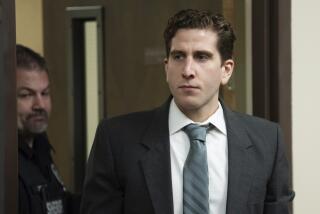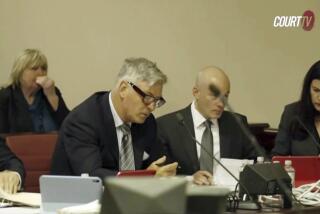The stakes are high for Dylann Roof, who will act as his own lawyer in sentencing phase of his murder trial
A federal judge on Monday ruled that Dylann Roof, the white supremacist found guilty last month of shooting nine parishioners at a Charleston, S.C., Bible study class, is competent to stand trial and represent himself in the sentencing part of his death penalty trial.
Judge Richard Gergel’s decision, announced after a daylong hearing that was closed to the public, represents yet another blow for Roof’s court-appointed attorneys, who have unsuccessfully tried to convince their client that his best chance of avoiding the death penalty is a mental health defense.
In an unusual move, the 22-year-old high school dropout has chosen to defend himself in the sentencing phase, dismissing his experienced capital defense attorney.
The stakes are high: If the jury imposes the death penalty, Roof will be the first person in American history sentenced to death in a federal hate-crimes trial. Yet the decision would have to be unanimous. Just one holdout on the jury of 10 women and two men could spare Roof from lethal injection.
Although federal attorneys will begin to call a procession of more than 30 witnesses on Wednesday in an attempt to convince the jury that Roof should be sentenced to death, Roof plans on calling no witnesses and presenting no evidence.
Such an imbalance between the prosecution and defense in a death penalty case — with the possibility that crucial sentencing information about the defendant’s mental health could be withheld from the jury — raises thorny legal questions. If the jury sentences Roof to death, the dispute about his mental health is likely to lead to years of appeals, legal experts say.
“I expect it to be a charade of a capital sentencing,” said Christopher Adams, a Charleston defense attorney who specializes in federal defense cases. “Here you have a guy who clearly is mentally ill, and he is not going to present any mental health evidence. So the jurors are going to be asked to make the toughest decision imaginable under law without any real information.”
“It really is a fraud upon the court, a fraud upon the public and a fraud upon the jurors to have a capital sentencing where only one party is presenting a case,” he added.
Last month, the jury found Roof guilty of all 33 counts in the June 17, 2015, massacre at Emanuel African Methodist Episcopal Church in Charleston, including committing a hate crime against black victims, obstructing the exercise of religion and using a firearm to commit murder.
Its verdict, which came after just two hours of deliberation, was not a surprise: Jurors had watched Roof confess in a taped FBI interview, heard from two survivors who identified him as the shooter and seen closed-circuit television images of him exiting the scene of the massacre with the murder weapon in his hand.
The Department of Justice is seeking the death penalty on the basis of Roof’s substantial planning and premeditation, his lack of remorse and “his animosity towards African Americans.”
All along, Roof has balked at the idea of defending himself on the basis that he is mentally ill. “I will not be calling mental health experts or presenting mental health evidence,” he wrote to Gergel the day after a jury found him guilty.
“I am morally opposed to psychology,” he scrawled in a journal that investigators found in his car after the massacre. “It is a Jewish invention, and does nothing but invent diseases and tell people they have problems when they don’t.”
Roof has a constitutional right to represent himself under the 6th Amendment. Yet some legal analysts point out that the 8th Amendment guarantees the right to a fair sentencing, which requires heightened scrutiny in a capital case.
“The Supreme Court has never addressed the issue of what happens when the government is not asking for a defendant to live with the consequences, but rather to die with the consequences,” Adams said. “The adversarial system just does not work unless there are two sides who are fighting it out.”
Early on, Roof’s attorneys filed paperwork stating they planned to introduce expert evidence that would demonstrate “mental disease or defect or any other mental condition bearing on the issue of punishment.”
Before the trial began, a rift emerged between Roof and his attorneys over the question of his mental health. The attorneys raised questions about their client’s mental state, asking the judge to declare Roof incompetent to stand trial. In a court motion, they noted that capital defendants often choose to represent themselves “in order to prevent presentation of mitigating evidence at the penalty phase of their trials that they cannot bear to have revealed.”
Gergel ordered Roof to take a psychiatric competency assessment, yet ultimately found him capable of standing trial, saying he had an “extremely high IQ” and was able to understand legal proceedings.
In his closing arguments to the jury during the guilt portion of the trial, Roof’s attorney David Bruck tried repeatedly to raise the issue of mental illness, drawing attention to his client’s “abnormal” and “delusional” behavior; his seeming inability, a day after the crime, to judge how many people he had killed; his unwillingness to make small talk with investigators; his admission to FBI agents that he didn’t have a best friend.
“He tells the FBI, ‘I’m not delusional,’” Bruck said to the jury. “When someone says that, common sense tells you he might be delusional.”
Roof, he argued, was a loner who had no friends, wore sweatpants under his jeans in the sweltering South Carolina heat and took hundreds of photos of his cat, yet none of his fellow human beings.
After the jury found Roof found guilty, and Roof reiterated his decision to represent himself in the sentencing phase, Roof’s attorneys asked the judge for a second hearing, again raising the question of Roof’s competency. A court-appointed forensic psychiatrist examined Roof over the New Year’s weekend, issuing a sealed report to the court. After interviewing the psychiatrist and a number of other witnesses, Gergel ruled that Roof remained competent to stand trial and to self-represent.
Although Roof has said he will not introduce witnesses, he is likely to deliver opening and closing statements during his sentencing phase. On Monday, Gergel issued firm ground rules, specifying that Roof sit at the third seat from the center aisle, address the jury from a lectern facing the jury and not “attempt to approach the jury, the witness stand or the bench.”
Jarvie is a special correspondent.
ALSO
Can a federal government scientist in California convince Trump that climate change is real?
Trump was silent on new U.S. sanctions against Russia, but he praises Putin’s response
This Congress filled the fewest judgeships since 1952. That leaves a big opening for Trump
UPDATES:
6:55 p.m.: The story was updated throughout with reporting from a special correspondent, replacing a wire report.
The story was originally posted at 4:20 p.m.
More to Read
Sign up for Essential California
The most important California stories and recommendations in your inbox every morning.
You may occasionally receive promotional content from the Los Angeles Times.











